The Mushroom That Roared: 7 Resounding Health Benefits of Lion’s Mane Mushroom
In a hurry? Click here to read the Article Summary...
Whether you’re a “foodie,” self-proclaimed “health nut,” or just like to be in the know about natural foods and substances that are good for the human body… the lion’s mane mushroom needs to be on your radar.
Lion’s mane is a rather unusual looking fungus with a flowing white, hair-like appearance that’s beloved as both a tasty edible mushroom and a medicinal mushroom in Japan and China. It’s also found in North America and was known to the native people who used it in powdered form for its ability to treat and heal open wounds.
Similar to many other varieties of medicinal mushrooms, lion’s mane prefers to grow on fallen hardwood trees, especially the beech tree. Its scientific name is Hericium erinaceus, while it’s also commonly known as yamabushitake in Japan and hóu tóu gu in China. You might also hear it referred to by other names, including:
- Satyr’s Beard
- Monkey Head Mushroom
- Bearded Tooth Mushroom
Whether you’ve never heard tell of it, or have seen it for sale at a farmer’s market or Asian food store and wondered, What is lion’s mane mushroom good for?… you’ll want to read on to discover these 7 key lion’s mane mushroom health benefits.
Lion’s Mane Mushroom Studies: What the Research Shows
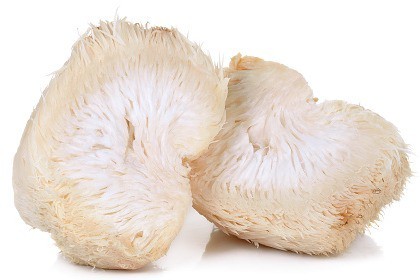
Scientific research over the past few decades has demonstrated that phytochemicals (natural, plant-based compounds) found within Hericium Erinaceus have some substantial benefits for health, including significant antioxidative activity.
The key compounds that appear to be chiefly responsible for the wide range of health benefits of lion’s mane mushroom are:
- hericenones
- erinacines
- beta-glucan polysaccharides
Lion’s mane mushroom is also known to be immunomodulatory, meaning that it can stimulate or suppress the immune system to enable it to better respond to threats.
Researchers have also reported cholesterol-lowering, nerve-protecting, nerve-regenerating, anti-diabetic, and anti-cancer properties. Want to discover more about the studied health benefits of lion’s mane? Let’s dive in!
#1. Lion’s Mane and the Nervous System
While a great deal of research has been done on this unusual mushroom, the “lion’s share” of that research (if you’ll pardon the pun) has been centered around its impact on the nervous system.
The nervous system comprises the brain, spinal cord, and the nerves that travel through the body. Everything works together to send and transmit nerve impulses, which are signals that control almost every function in the human body.
When an injury occurs to the brain or spinal cord, it can take a long time to heal. Excitingly, research on lion’s mane mushroom (let’s abbreviate that to LMM) has found that it helps to speed recovery from these types of injuries.

First off, LMM stimulates the production of nerve growth factor (NGF), a protein that stimulates nerve cells to grow. LMM also has neuroprotective properties and helps regenerate damaged cells.
LMM has also been widely studied with regard to its ability to help diseases of an aging nervous system, including:
- dementia
- stroke
- Parkinson’s disease
- Alzheimer’s disease
Since pharmaceutical companies have spent billions on finding medications to cure or at least relieve the symptoms of these serious health conditions with limited success, any progress in this area is incredibly promising. It’s important to point out, however, that the research into LMM’s potential benefit for these specific diseases is still preclinical (i.e., studied in test tubes and with laboratory animals).
Many Studies into Lion’s Mane Benefits for the Brain and Nervous System
Researchers conducting studies on lion’s mane mushroom extracts have reported the following benefits in relation to the brain and nervous system:
- Provides potent antioxidants that afford anti-inflammatory protection to nerves [1,2].
- May improve mild cognitive impairment, both in animals and in people [3-5].
- Induces the secretion of nerve growth factor (NGF), a protein involved in the regulation of growth, maintenance, and survival of nerve fibers [6-8].
- Has neuroprotective properties [9-12].
- May help protect against and ease the symptoms of Alzheimer’s disease [13-16].
- Exerts a positive influence on the fatty material that wraps protectively around nerve cells and helps to transmit electrical signals from nerve to nerve. Known as myelin, it is the loss of this protective fatty layer around nerve cells that leads to diseases like Multiple Sclerosis and other neurodegenerative diseases [17].
- May promote nerve healing and regeneration following injury [18-20].
- May ease the symptoms of diabetic neuropathy [21].
- May help protect against the progression of aging and degeneration of the nervous system [22].
- May help to prevent the death of nerve cells and brain damage after seizures or stroke [23,24].
- Is easily absorbed by the brain and body, as lion’s mane compounds have the ability to cross through the protective blood-brain barrier [25].
#2. Lion’s Mane and Depression & Anxiety

Antidepressants have become one of the most widely prescribed medications across the globe [26]. The most popular variety is known as Selective Serotonin Reuptake Inhibitors (SSRIs), which enhance the neurotransmitter serotonin in the brain.
SSRIs are prescribed not only for depression but also for anxiety, eating disorders, obsessive-compulsive disorder, and a number of other mental health conditions.
A potential problem with SSRIs, however, is that they tend to come with a long list of side effects. Some of the more common SSRI side effects include [27]:
- insomnia
- skin rashes
- headaches
- muscle and joint pain
- digestive upset
- nausea
- diarrhea
- diminished sexual interest
Lion’s mane mushroom (LMM) has been reported to have anti-depressant activity, both in preclinical animal studies and human trials. The mycelia of the mushroom contain the phytochemical erinacine, which has been shown to help with the creation of neurotrophic factors in the brain [28].
Neurotrophic factors influence the growth, survival, and other functions of neurons (nerve cells). This action of erinacine has been hypothesized to play a role in depression.
Also, as noted before, LMM also stimulates the synthesis of nerve growth factor (NGF), which has an effect on brain and nervous system function [29].
A small 2010 human trial [30] found that only four weeks of taking LMM by 30 menopausal women reduced depression and anxiety in this group.
In an effort to better understand the effects of LMM on the brain and nervous system, a 2018 animal study [31] found that four weeks of administration promoted the generation of new nerve cells in the hippocampal region of the brain. (The hippocampus is involved in higher cognitive function, memory, and behavior.) Researchers also found that LMM extracts reduced anxiety and depression in test animals.
Another 2018 animal study [32] reported that administration of LMM increased levels of the neurotransmitters norepinephrine, dopamine, and serotonin in the brain. LMM also blocked inflammatory pathways and regulated neurotrophic factors (as discussed above).
A 2019 human clinical trial [33] found that LMM given to 77 overweight or obese volunteers prone to binge eating decreased levels of depression and anxiety, and improved sleep after only eight weeks.
#3. Lion’s Mane and Hearing Loss
With so many studies demonstrating that LMM has profound effects on the nervous system, it’s no surprise that scientists have begun investigating whether it can also help the nerves associated with hearing.

Presbycusis, the most common type of hearing loss, caused by the natural aging of the auditory system, has been shown in studies to often precede the onset of clinical dementia. Scientists also believe this hearing loss may be an early warning signal of the onset of Alzheimer’s disease [34].
Human studies involving patients with sensorineural hearing defects (hearing loss where the root cause lies in the inner ear or the vestibulocochlear nerve) have found that the amount of circulating nerve growth factor is relatively low compared to the level found in patients with normal hearing [35].
A 2018 review of medical studies [36] investigating LMM for its effects on nerves discussed a particular study with aging mice. The results of the study indicated that the animals treated with LMM had significantly lower hearing thresholds compared with the control group. In other words, LMM helped the animals to hear better. LMM was also found to be effective in slowing hearing deterioration.
While this beneficial effect on hearing has not yet been proven in humans, it points once again to the significant beneficial role that lion’s mane mushroom is believed to have on nerve health.
#4. Lion’s Mane and the Immune System
Similar to other medicinal mushrooms like reishi, turkey tail, and maitake, lion’s mane mushrooms have demonstrated important benefits for the immune system.
Many studies [37-40] have concluded that lion’s mane mushrooms are immunomodulating agents, which means they have the ability to either stimulate or suppress the immune system (depending on what it may need) and may help the body fight infections, cancer, or other diseases.
This ability to modulate the immune system, in simpler terms, means that if the immune system is under-reacting to a threat (such as abnormal cell growth), LMM can help to augment its activity. In instances where the immune system is over-reacting, as it does with allergies and health problems like rheumatoid arthritis, LMM can act to help dampen down the immune response and inhibit its action.
#5. Lion’s Mane and the Digestive System
Many people are paying a lot more attention to their digestive health these days, and for good reason. If you’re not absorbing food and nutrients properly due to digestive disorders such as “leaky gut” (intestinal permeability) or irritable bowel syndrome (IBS), you won’t be feeling as well as you might, nor operating at your best.
LMM has been shown in a number of studies to assist digestive health in several ways. Firstly, it acts as a prebiotic, providing food for and helping beneficial gut bacteria do their important work [41].
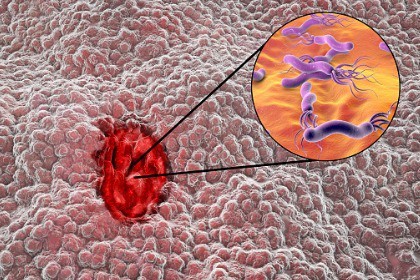
LMM also protects against the development of stomach ulcers by inhibiting the growth of a pathogen known as Helicobacter pylori, which has been shown to be related to the development of stomach ulcers [42-45]. In addition, LMM exerts a protective effect on the inner layer of the digestive tract, known as the mucosa [46].
Both animal and human studies [47-53] have demonstrated that the anti-inflammatory benefits of LMM help to ease the symptoms of colitis and ulcerative colitis, and other chronic inflammatory gut conditions.
#6. Lion’s Mane and Heart Health
There are a number of potential health benefits for the cardiovascular system when supplementing with lion’s mane mushroom.
Platelets are a necessary component of the blood. For instance, when you cut yourself, they keep you from bleeding to death by forming a clot at the site of the injury. However, when platelets begin to clump together abnormally, this can raise your risk of cardiovascular disease. A 2010 study [54] found that LMM inhibited the clumping of platelets.
High blood cholesterol levels can also increase the risk of cardiovascular disease. Several studies have demonstrated the ability of LMM to improve the metabolism of fats and to lower cholesterol levels [55-57].
Additionally, an in vitro (test tube) study found that LMM may help to prevent the oxidation of cholesterol in the bloodstream [58]. The importance here is that cholesterol molecules, when oxidized, can attach to arterial walls and cause them to harden. This hardening has been found to increase the risk of stroke and heart attacks.
#7. Lion’s Mane and Healthy Cell Activity
LMM may also be beneficial for promoting healthy cellular activity due to its impressive array of antioxidants, beta-glucan polysaccharides, and other phytochemicals that work in a variety of ways within the body.
Preclinical studies with cells and animals have shown that lion’s mane mushrooms have significant antitumor effects against:

- breast cancer cells [59]
- colon cancer [60,61]
- leukemia [62-64]
- gastrointestinal cancer [65-67]
- cervical cancer [68]
- liver cancer cells [69-71]
Since there have been few to no human studies performed yet utilizing lion’s mane for cancer patients, it is NOT advisable to rely solely on lion’s mane for your cancer therapy.
Combined with other treatments, however, LMM may offer some benefits for cancer patients, especially insofar as they help to modulate the action of the immune system. Animal studies to date have shown that lion’s mane mushrooms are non-toxic and safe to use [72].
Lion’s Mane Mushroom Studies Reveal Even More Potential Health Benefits
If all of the amazing Lion’s mane mushroom health benefits listed above aren’t enough, researchers have turned up even MORE potential health benefits of lion’s mane.
Here’s a quick rundown of 7 ADDITIONAL lion’s mane mushroom benefits:
- Anti-viral – A 2010 study [73] found that LMM had anti-viral properties against Human Immunodeficiency Virus 1 (HIV-1), the virus that can lead to AIDS.
- Anti-microbial – A 2012 animal study [74] demonstrated the anti-microbial properties of LMM. Researchers found that daily supplementing the feed of mice infected with Salmonella typhimurium (which can cause food poisoning, gastroenteritis, typhoid fever, or enteric fever) with LMM nearly quadrupled their life span.
- Kidney-protective – A 2013 study [75] found that LMM had kidney-protective properties.
- Liver-protective – 2015 research [76] found that LMM was liver-protective.
- Obesity-related inflammation – A 2015 study [77] found that LMM prevented or eased the inflammation released by fat tissue associated with obesity.
- Anti-diabetic – Several preclinical studies [78,79] have demonstrated the anti-diabetic, blood-sugar-lowering properties of LMM.
- Muscle endurance – A 2019 animal study [80] found that supplementation with LMM enhanced and increased muscle endurance.
Where to Get Lion’s Mane Mushroom?
If you’ve never eaten lion’s mane mushroom, there is certainly strong evidence to add this functional food into your recipe repertoire (we have some tips on cooking mushrooms here).
Fresh lion’s mane mushrooms are a bit of a specialty item that you probably won’t find on many supermarket shelves. Depending on where you live, you may be able to find them in gourmet food shops, farmer’s markets seasonally, or in Asian food stores.
Because sourcing fresh lion’s mane mushrooms can be challenging (not to mention you need to be 100% assured with mushrooms that you’re getting the correct edible variety), supplementation can be a convenient alternative.
If you go this route, it’s important to work with a qualified healthcare practitioner and only purchase USDA-Certified Organic products from a manufacturer you can trust.
Lion’s mane mushroom is one of the 7 potent nutritional mushrooms found in Organixx 7 Mushrooms formula. The organic mushroom varieties selected for 7 Mushrooms are among the most clinically researched mushrooms on Earth, known for their immune system support and anti-aging properties.
7 Mushrooms from Organixx contains 7 of nature’s most powerful mushrooms for anti-aging, longevity, and immune support. Using centuries-old knowledge of the power of nutritional mushrooms and our breakthrough new formulation process we’ve unleashed the power of mushrooms in a way never before done.
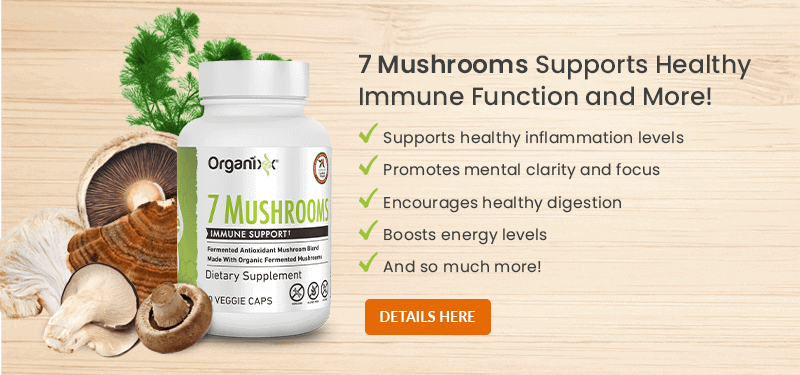
 Sources:
Sources:
Article Summary
Lion’s mane is a rather unusual looking fungus with a flowing white, hair-like appearance that’s beloved as both a tasty edible mushroom and a medicinal mushroom in Asia.
Its scientific name is Hericium erinaceus while it’s also commonly known as yamabushitake in Japan and hóu tóu gu in China. It’s also referred to by other names including Satyr’s Beard, Monkey Head Mushroom, and Bearded Tooth Mushroom.
Scientific research over the past few decades has demonstrated that phytochemicals (natural, plant-based compounds) found within lion’s mane mushrooms have some substantial benefits for health, including significant antioxidative activity.
Lion’s mane mushroom is also known to be immunomodulatory, meaning that it can stimulate or suppress the immune system as needed to enable it to better respond to threats.
7 of the key areas of health studied in connection with lion’s mane mushroom are:
- the nervous system
- depression & anxiety
- hearing loss
- the immune system
- the digestive system
- heart health
- healthy cell activity
Lion’s mane mushroom is one of 7 potent nutritional mushrooms found in Organixx 7 Mushrooms formula.


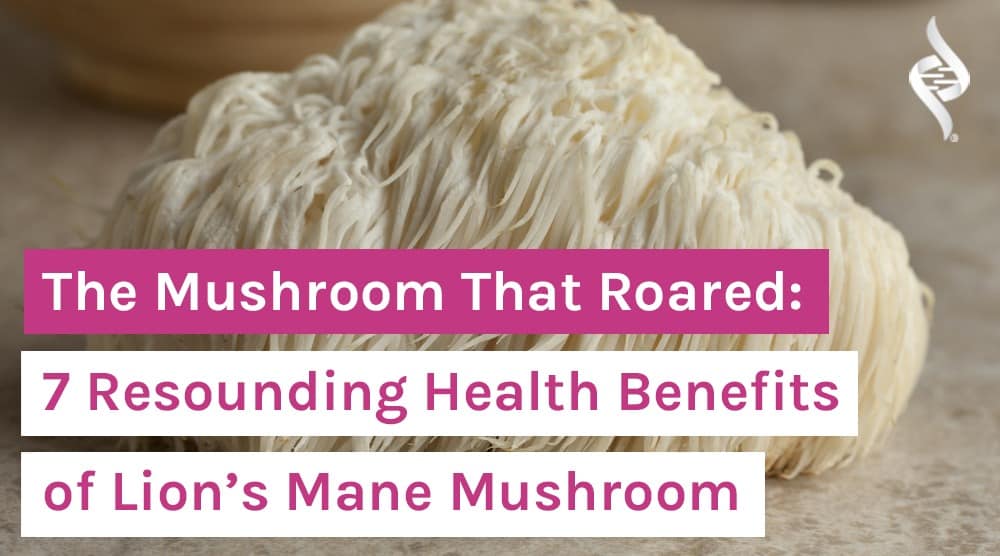
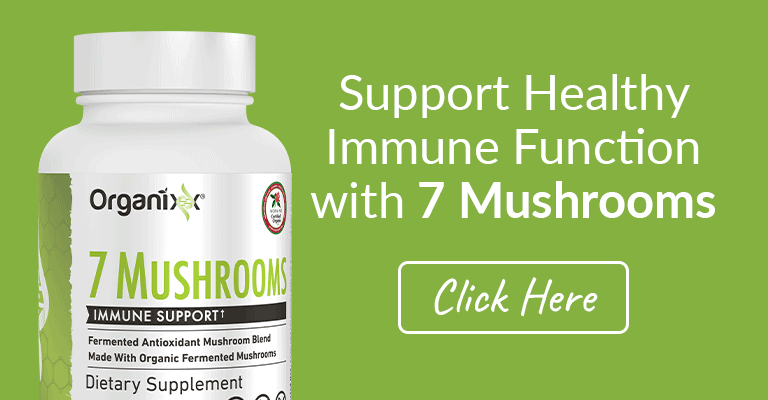

What is the equivalency of 1 capsule to Number of Mushrooms Ratio?
Hi Shelley,
1 capsule contains 700mg of the mushroom blend.
I hope you find this information helpful.
Have a happy and healthy day! :)
Is taking a pill the same as eating the actual mushroom?
Hello David,
We appreciate your question. While we always encourage everyone to get their daily intake of vitamins and minerals through their diet we understand that this is not always possible or practical. Obtaining vitamins and minerals through whole foods is in most cases the best thing to do. However, supplementation through capsules, pills, powders and more is still a very beneficial way to make sure that our bodies are getting the nutrients needed. Many doctors do recommend supplementing this way as well. I hope you find this information helpful. Have a happy and healthy day!
I took Lion's mane mushroom and it made my skin itch--is there any way to do away with this side effect?
We're sorry to hear that Evelyn. Thanks for sharing your experience with us.
One of the known side effects of Lions Mane is itchy skin. As long as the itchy skin doesn’t come with swollen glands, hives, or any other indication of an allergic reaction, chances are it’s just a sign of increased NGF (Nerve Growth Factor). While uncomfortable, the itchy skin is a sign that you are increasing your supply of NGF and the Lion’s Mane is working.
Lion’s mane mushroom is one of 7 potent nutritional mushrooms found in Organixx 7M+ formula. It contains an organic mushroom blend of turkey tail, chaga, shiitake, maitake, cordyceps, lion’s mane, and reishi mushrooms. The organic mushroom varieties selected for 7M+ are among the most clinically researched mushrooms on Earth, known for immune system support and anti-aging properties.
While there haven't been any reported side effects with our product, each individual may have a different experience due to their specific health needs. With that being said, we always advise consulting with your trusted health care practitioner prior to starting any new supplement or health regimen, especially if you have concerns about a potential allergic reaction.
If you would like to learn more about our 7M+ supplement, we encourage you to refer to the following page where you will find product details, ingredient label, customer reviews, and more: https://shop.organixx.com/products/7m-plus
We hope you find this information helpful and wish you all the best in health & happiness.
I would like to try it as i really think it is superior
Hi Bob, thanks for your feedback.
We're glad you enjoyed this article about the Lion's Mane Mushroom. We would love to invite you to check out our very own mushroom supplement that we formulated with the Lion's Mane . It is called the 7M+ and it is formulated with proprietary blend of 7 potent nutritional mushrooms known for immune system support and anti-aging properties:
https://shop.organixx.com/collections/all-products/products/7m-plus
We hope you find it informative. Wishing you a lovely day!